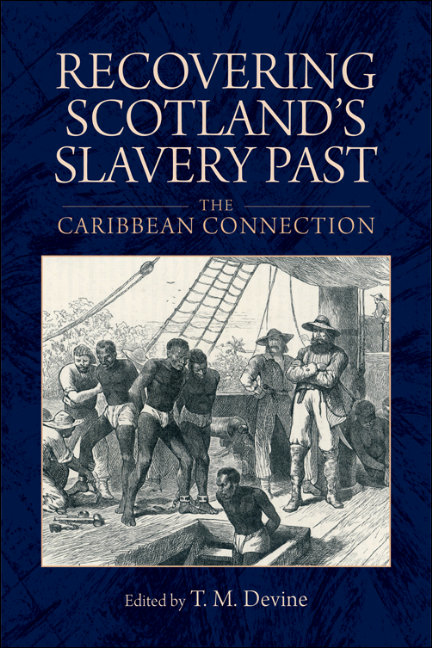Book contents
- Frontmatter
- Contents
- List of Illustrations and Tables
- List of the Contributors
- Acknowledgements
- Foreword
- map
- Introduction: Scotland and Transatlantic Slavery
- 1 Lost to History
- 2 Yonder Awa: Slavery and Distancing Strategies in Scottish Literature
- 3 Early Scottish Sugar Planters in the Leeward Islands, c. 1660–1740
- 4 The Scots Penetration of the Jamaican Plantation Business
- 5 ‘The habits of these creatures in clinging one to the other’: Enslaved Africans, Scots and the Plantations of Guyana
- 6 The Great Glasgow West India House of John Campbell, senior, & Co.
- 7 Scottish Surgeons in the Liverpool Slave Trade in the Late Eighteenth and Early Nineteenth Centuries
- 8 Scotland and Colonial Slave Ownership: The Evidence of the Slave Compensation Records
- 9 ‘The Upas Tree, beneath whose pestiferous shade all intellect languishes and all virtue dies’: Scottish Public Perceptions of the Slave Trade and Slavery, 1756–1833
- 10 ‘The most unbending Conservative in Britain’: Archibald Alison and Pro-slavery Discourse
- 11 Did Slavery make Scotia Great? A Question Revisited
- Conclusion: History, Scotland and Slavery 246
- Index
3 - Early Scottish Sugar Planters in the Leeward Islands, c. 1660–1740
Published online by Cambridge University Press: 15 December 2017
- Frontmatter
- Contents
- List of Illustrations and Tables
- List of the Contributors
- Acknowledgements
- Foreword
- map
- Introduction: Scotland and Transatlantic Slavery
- 1 Lost to History
- 2 Yonder Awa: Slavery and Distancing Strategies in Scottish Literature
- 3 Early Scottish Sugar Planters in the Leeward Islands, c. 1660–1740
- 4 The Scots Penetration of the Jamaican Plantation Business
- 5 ‘The habits of these creatures in clinging one to the other’: Enslaved Africans, Scots and the Plantations of Guyana
- 6 The Great Glasgow West India House of John Campbell, senior, & Co.
- 7 Scottish Surgeons in the Liverpool Slave Trade in the Late Eighteenth and Early Nineteenth Centuries
- 8 Scotland and Colonial Slave Ownership: The Evidence of the Slave Compensation Records
- 9 ‘The Upas Tree, beneath whose pestiferous shade all intellect languishes and all virtue dies’: Scottish Public Perceptions of the Slave Trade and Slavery, 1756–1833
- 10 ‘The most unbending Conservative in Britain’: Archibald Alison and Pro-slavery Discourse
- 11 Did Slavery make Scotia Great? A Question Revisited
- Conclusion: History, Scotland and Slavery 246
- Index
Summary
IN THE EARLY STAGES of Scottish transatlantic trade, the 1660s was a key decade, with the founding of Port Glasgow, the first Scottish sugar houses, and the first signs of the benefits of trade in Glasgow. In the British Americas the 1660s was also the decade that black chattel slavery took hold. Though separated by the Atlantic, these phenomena were hardly coincidental. Of the three stages of transatlantic commerce, namely: cultivation in the colonies; shipping across the Atlantic; and processing and marketing in Britain, it is really only the second and third stages which have received significant attention in Scotland.
In Scottish history the direct connection between the import of transatlantic staples and slave labour has rarely been made until recently. Yet the gradual increase in transatlantic trade could not occur without cultivation of the staples by the growing enslaved workforce. The rise in the use of enslaved Africans becomes of even greater interest to this volume if Scots were directly involved in their control and ownership. This chapter investigates the rise of Scots operating as planters in the Americas. It asks how deeply, and to what scale, Scots were involved in the ownership and control of enslaved Africans. As the leading staple in the pre-1740 period was sugar, the focus is on sugar plantations in one part of the British Caribbean.
Although Caribbean sugar plantations in the study period are relatively well documented from an English perspective, it is important to ask why we should revisit the subject from a Scottish angle. The answer is primarily a question of balance: to balance the attention paid to transatlantic trade in Scotland; to balance the acknowledged role of Scots on various British Caribbean islands from the end of the study period; finally, to balance the enormous social success of sugar planters in Scotland.
Building on the work of E. V. Goveia and L. J. Ragatz, the most prominent historian in the middle decades of the twentieth century to seriously consider slavery from the Caribbean side of the Atlantic was Eric Williams.
- Type
- Chapter
- Information
- Recovering Scotland's Slavery PastThe Caribbean Connection, pp. 62 - 81Publisher: Edinburgh University PressPrint publication year: 2015



